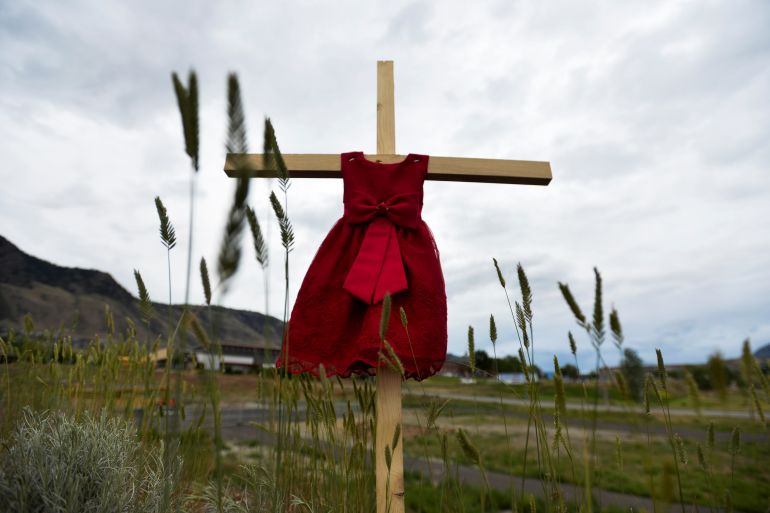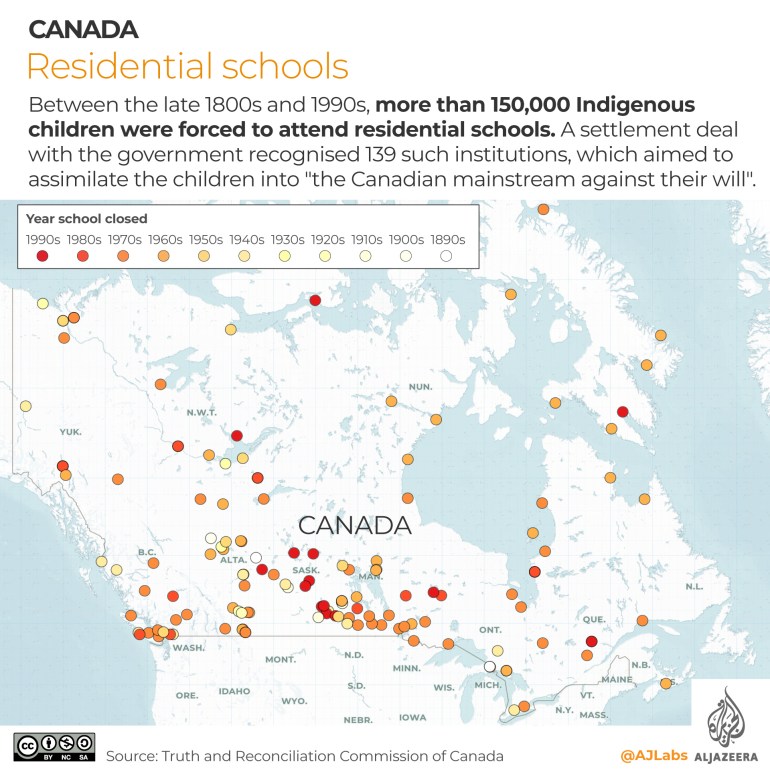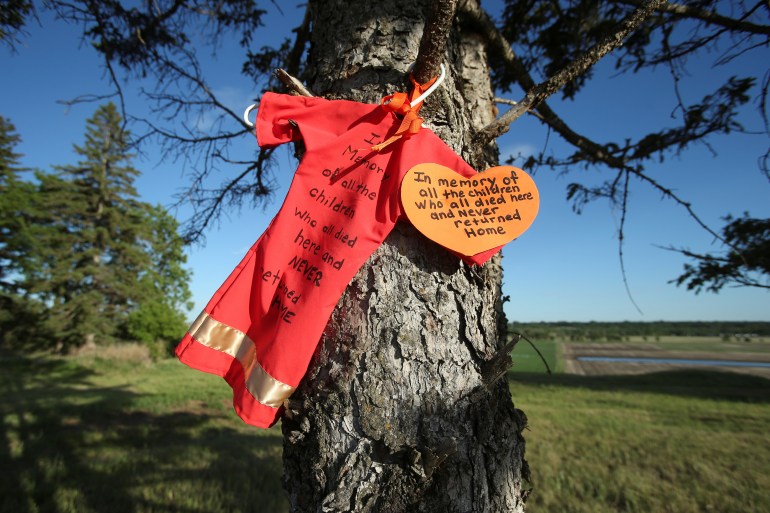Canada: Day for Truth and Reconciliation spurs calls for action
Indigenous leaders call for action, accountability on Canada’s first official National Day for Truth and Reconciliation.

Warning: The story below contains details of residential schools that may be upsetting. Canada’s Indian Residential School Survivors and Family Crisis Line is available 24 hours a day at 1-866-925-4419.
Montreal, Canada – It is National Day for Truth and Reconciliation in Canada.
Keep reading
list of 4 itemsCanada: Protesters demand investigation into residential schools
Canada pledges millions to search for residential school graves
Indigenous leaders urge action as Canada’s election nears
The federal holiday, being marked for the first time on Thursday, aims to honour the Indigenous children who died at or survived so-called “residential schools” – forced-assimilation institutions rife with abuse that operated for decades.
It was created in response to the Calls to Action of a federal commission of inquiry into the institutions, which concluded in 2015 that Canada’s residential schools system amounted to “cultural genocide”.
It also comes after hundreds of unmarked graves were discovered since May on the sites of the former facilities, spurring calls for accountability from the government that funded them and the churches, particularly the Roman Catholic Church, that ran them.
“The mindset that put into place the residential schools and the system of settler colonialism that Canada and Canadians benefit from … that all still is continuing to this day,” said Eva Jewell, research director of the Yellowhead Institute, a First Nations think-tank.
“I’m hopeful that Canadians can pay attention to the current events and see that injustices continue to happen on the part of the Canadian government,” she told Al Jazeera.

Events are taking place across the country on Thursday, which is also Orange Shirt Day, an Indigenous-led initiative to remember and honour residential school survivors, their families and their communities, as well as the Indigenous children who never returned.
“It’s time to honour the children, and the unrelenting spirit of these Ancestors,” said Kukpi7 Rosanne Casimir of Tk’emlups te Secwepemc First Nation, which discovered the remains of more than 200 Indigenous children on the grounds of the former Kamloops Indian Residential School in British Columbia in May.
The community is calling (PDF) on people around the world to drum and sing on Thursday in honour of the children. “It’s time to drum for the healing of the Indian Residential Schools Survivors who carried the burden of knowing where the children were buried, and to drum for the healing of the families and communities whose children did not come home,” Casimir said in a statement.
‘Dig up the truth’
The Canadian government forced more than 150,000 First Nations, Inuit and Metis children to attend residential schools between the late 1800s and 1990s. The children were stripped of their languages and culture, separated from siblings, sent hundreds of kilometres away from home, and subjected to psychological, physical and sexual abuse. Thousands are believed to have died.
The Truth and Reconciliation Commission of Canada, which concluded six years ago that the residential schools policy amounted to “cultural genocide”, also released (PDF) 94 Calls to Action to address the lasting harms and inter-generational trauma linked to the institutions.

Former Canadian Prime Minister Stephen Harper apologised for residential schools in 2008, and current Prime Minister Justin Trudeau has pledged financial aid and other support to help Indigenous communities find more unmarked graves and address the system’s lasting harms.
“We must all learn about the history and legacy of residential schools. It’s only by facing these hard truths, and righting these wrongs, that we can move forward together toward a more positive, fair, and better future,” Trudeau said in a statement on Thursday.
The Canadian Conference of Catholic Bishops apologised last week for the church’s role in residential schools, while on Monday they announced 30 million dollars Canadian ($23.5m) in funding over five years “to support healing and reconciliation initiatives”.
But Indigenous leaders and residential school survivors have called for a formal apology from the Pope himself, who after the first unmarked graves were discovered earlier this year stopped short of meeting that long-sought demand.
An analysis last year by the Yellowhead Institute also found that the Canadian government had only completed eight of the TRC’s Calls to Action, fuelling criticism of Trudeau for failing to meet his pledge to fully implement the recommendations.
Nakuset, executive director of the Native Women’s Shelter of Montreal and co-organiser of an “Every Child Matters” march in the city on Thursday, told Al Jazeera the National Day for Truth and Reconciliation needs to go beyond reflection and be “a day of action”.
“What are the concrete steps that we need to take in order for all those children that are under the ground, and all the parents that have no idea that their children have passed on – these kids have to be identified. There’s so much work that needs to be done,” she said.
“We don’t want you to just remember – because you weren’t even there and the government covered it up, so there’s nothing for you to remember. We need you to dig up the truth.”
Nakuset also questioned why Quebec, among other provinces, has not designated September 30 as an official holiday, like it is at the federal level. That concern was also raised by a First Nation leader in neighbouring Ontario.
“This upcoming statutory holiday is an important symbol indicating a commitment to practical action,” Six Nations of the Grand River Chief Mark B Hill said in a recent letter to Ontario Premier Doug Ford. “It is not enough that leaders give a few remarks on occasion, only to let pass more formal opportunities to officially acknowledge where we’ve come from and where we need to go.”
Recognising the truth
Raven Sinclair, a professor of social work at the University of Regina, said recognising Canada’s continuing mistreatment of Indigenous people is critical before any reconciliation can take place.
That includes the seizure of Indigenous lands, lack of clean drinking water in First Nations communities, inadequate funding of Indigenous child and family services, the Sixties Scoop, and the disproportionate number of missing and murdered Indigenous women and girls across the country.
The recently discovered unmarked graves are a metaphor for the relationship between Indigenous people and Canada, which “has been hidden from the public, from the public eye, and that’s very deliberate”, Sinclair told Al Jazeera.
“This collective ignorance about the actual realities of colonialism and the things that Indigenous people have experienced, that [string of discoveries] confronted people. That slapped people right in the face,” she said.

“Reconciliation requires people to understand what the harms are and then to do whatever they can to stop it,” Sinclair added – a sentiment that was echoed by Jewell, who said National Day for Truth and Reconciliation is a chance for Canadians to reflect on the true nature of the country.
“A lot of Canadians are attempting to jump to reconciliation, want to make amends, without really mulling over or reflecting on what that truth means and how they can actually end the inequities Indigenous peoples are facing,” she said.
“The ongoing impacts of residential schools are felt and experienced every day. Reconciliation oftentimes precedes accepting the truth of the fact that this is a country founded on violence and settler colonialism, and the dispossession of Indigenous land.”